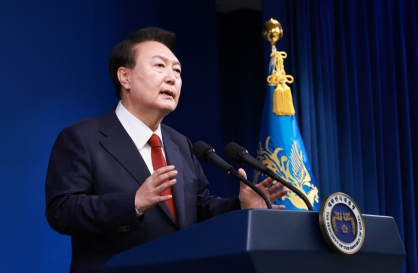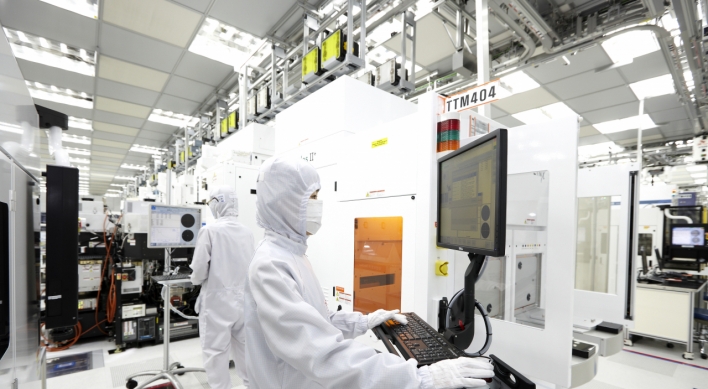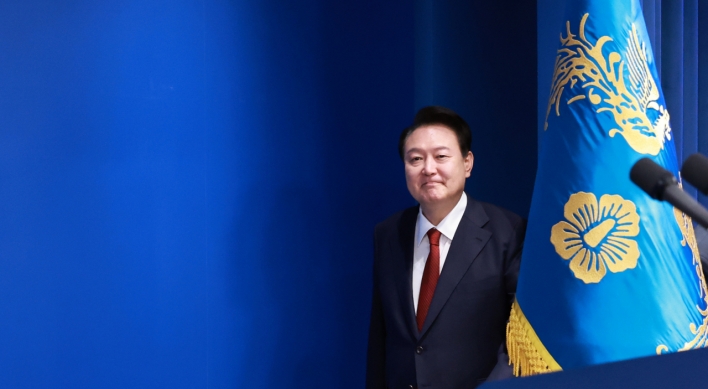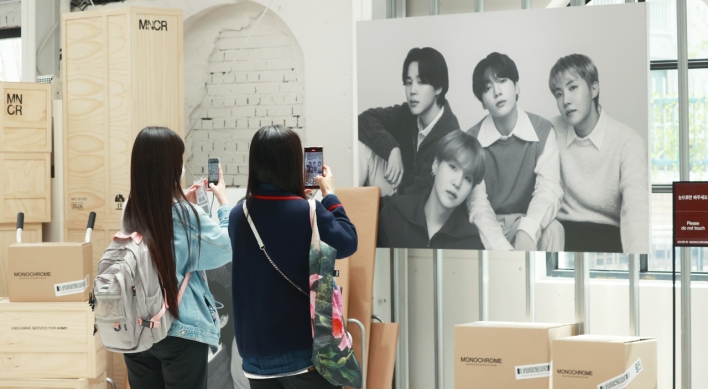JEJUDO ISLAND -- With bilateral, territorial and historical tensions threatening to overshadow the broader and indispensable need for regional collaboration, world leaders Thursday at the Jeju Forum warned against brewing nationalism.
While raising the need to concede to and apologize for past wrongdoings, they highlighted the significance of reconciliation efforts and a joint response to common challenges such as terrorism, climate change and refugee crises.
U.N. Secretary-General Ban Ki-moon, South Korean Prime Minister Hwang Kyo-ahn, former Japanese Prime Minister Tomiichi Murayama and other sitting and retired top officials also relayed concerns about North Korea’s continuous nuclear development, which they said cast a shadow across the region and the globe.
While raising the need to concede to and apologize for past wrongdoings, they highlighted the significance of reconciliation efforts and a joint response to common challenges such as terrorism, climate change and refugee crises.
U.N. Secretary-General Ban Ki-moon, South Korean Prime Minister Hwang Kyo-ahn, former Japanese Prime Minister Tomiichi Murayama and other sitting and retired top officials also relayed concerns about North Korea’s continuous nuclear development, which they said cast a shadow across the region and the globe.

Yet Ban raised the need to explore ways to restart talks to move toward denuclearization of the peninsula, urging Pyongyang to refrain from additional nuclear and missile tests or other provocations.
“The DPRK (North Korea) pursuit of nuclear weapons and ballistic missiles only undermines its own security and hurts its citizens,” he said in his keynote speech during the opening ceremony. “But we must find the path back to dialogue.”
The former South Korean top diplomat also indicated his intention to visit the communist country, a move that he had previously pursued, yet which failed to materialize due chiefly to political circumstances and Pyongyang’s last-minute cancellation.
At a meeting with senior journalists a day earlier, Ban also said he is the first-ever U.N. chief to maintain a “high-level dialogue channel” with Pyongyang.
“I welcome all efforts to move forward, and I stand ready to personally contribute in any way that might be helpful,” he added.
“Good relations between the two Koreas are essential for lasting peace, not only on the Korean Peninsula, but throughout the region.”
In his own address, Hwang reaffirmed Seoul’s commitment to sanctions and pressure against the Kim Jong-un regime so as to form an “environment where North Korea has no other option but to take the path of change.”
South Korea has been hardening its stance against its defiant neighbor since its latest atomic and long-range rocket experiments early this year. It pulled out from a joint industrial complex in the North, levied a set of crippling individual sanctions and brushed off recent offers of military talks, demanding it take denuclearization steps.
“This is designed to alter the behavior and calculations of the North, which rejects sincere dialogue and faith so that we can chart a genuine trust-building process on the peninsula,” the prime minister said.
Murayama emphasized settling the history of past wars and colonial rule as a “first priority” in fostering peace and cooperation in Asia, highlighting his watershed 1995 apology for Japan’s sex slavery, forced labor and other atrocities during World War II.
The 92-year-old retired socialist premier blasted the incumbent Shinzo Abe’s revisionist push that had led to Abe’s statement last August that has been accused of attempting to whitewash the country’s imperial past.
He also pointed to heightened tensions stemming from Pyongyang’s nuclear threats and the territorial row in the East China Sea between Beijing and Japan, expressing concerns over possible future military clashes.
“The second priority is that there must not be another war in the region,” Murayama said in a speech, calling for Japan and the U.S. to formulate ways to shift its respective relations with the North.
“Though the situation has recently eased, China and Japan experienced substantial tension around the islands (Senkaku/Diayou).
“As both sides have things to say, Japan should acknowledge that there is a territorial dispute. ... I believe it’ll be desirable for the two countries to develop them together and make the islands of peace.”
Following a series of keynote addresses, Murayama took part in a discussion with other former premiers on the forum’s theme, “Asia’s new order and cooperative leadership.” The other participants include Mahathir bin Mohamad of Malaysia, Jim Bolger of New Zealand, Goh Chok Tong of Singapore and Enrico Letta of Italy.
Meanwhile, Ban for the second consecutive day hogged the limelight with attention given to his domestic political aspirations. He held a 30-minute talk with Hwang and a lunch meeting with Jejudo Island Gov. Won Hee-ryong, former South Korean Prime Minister Lee Hong-koo and other dignitaries. He then left in the afternoon for Japan to attend the G7 summit.
Wrapping up the three-day conference, high-flying entrepreneurs are scheduled to give lectures Friday, including Joe Kaeser, president and chief executive of Siemens AG, and Jeffrey Straubel, chief technology officer and cofounder of Tesla Motors, followed by a closing ceremony.
By Shin Hyon-hee (heeshin@heraldcorp.com)
“The DPRK (North Korea) pursuit of nuclear weapons and ballistic missiles only undermines its own security and hurts its citizens,” he said in his keynote speech during the opening ceremony. “But we must find the path back to dialogue.”
The former South Korean top diplomat also indicated his intention to visit the communist country, a move that he had previously pursued, yet which failed to materialize due chiefly to political circumstances and Pyongyang’s last-minute cancellation.
At a meeting with senior journalists a day earlier, Ban also said he is the first-ever U.N. chief to maintain a “high-level dialogue channel” with Pyongyang.
“I welcome all efforts to move forward, and I stand ready to personally contribute in any way that might be helpful,” he added.
“Good relations between the two Koreas are essential for lasting peace, not only on the Korean Peninsula, but throughout the region.”
In his own address, Hwang reaffirmed Seoul’s commitment to sanctions and pressure against the Kim Jong-un regime so as to form an “environment where North Korea has no other option but to take the path of change.”
South Korea has been hardening its stance against its defiant neighbor since its latest atomic and long-range rocket experiments early this year. It pulled out from a joint industrial complex in the North, levied a set of crippling individual sanctions and brushed off recent offers of military talks, demanding it take denuclearization steps.
“This is designed to alter the behavior and calculations of the North, which rejects sincere dialogue and faith so that we can chart a genuine trust-building process on the peninsula,” the prime minister said.
Murayama emphasized settling the history of past wars and colonial rule as a “first priority” in fostering peace and cooperation in Asia, highlighting his watershed 1995 apology for Japan’s sex slavery, forced labor and other atrocities during World War II.
The 92-year-old retired socialist premier blasted the incumbent Shinzo Abe’s revisionist push that had led to Abe’s statement last August that has been accused of attempting to whitewash the country’s imperial past.
He also pointed to heightened tensions stemming from Pyongyang’s nuclear threats and the territorial row in the East China Sea between Beijing and Japan, expressing concerns over possible future military clashes.
“The second priority is that there must not be another war in the region,” Murayama said in a speech, calling for Japan and the U.S. to formulate ways to shift its respective relations with the North.
“Though the situation has recently eased, China and Japan experienced substantial tension around the islands (Senkaku/Diayou).
“As both sides have things to say, Japan should acknowledge that there is a territorial dispute. ... I believe it’ll be desirable for the two countries to develop them together and make the islands of peace.”
Following a series of keynote addresses, Murayama took part in a discussion with other former premiers on the forum’s theme, “Asia’s new order and cooperative leadership.” The other participants include Mahathir bin Mohamad of Malaysia, Jim Bolger of New Zealand, Goh Chok Tong of Singapore and Enrico Letta of Italy.
Meanwhile, Ban for the second consecutive day hogged the limelight with attention given to his domestic political aspirations. He held a 30-minute talk with Hwang and a lunch meeting with Jejudo Island Gov. Won Hee-ryong, former South Korean Prime Minister Lee Hong-koo and other dignitaries. He then left in the afternoon for Japan to attend the G7 summit.
Wrapping up the three-day conference, high-flying entrepreneurs are scheduled to give lectures Friday, including Joe Kaeser, president and chief executive of Siemens AG, and Jeffrey Straubel, chief technology officer and cofounder of Tesla Motors, followed by a closing ceremony.
By Shin Hyon-hee (heeshin@heraldcorp.com)











![[K-pop’s dilemma] Time, profit pressures work against originality](http://res.heraldm.com/phpwas/restmb_idxmake.php?idx=644&simg=/content/image/2024/05/08/20240508050705_0.jpg&u=20240508171126)






